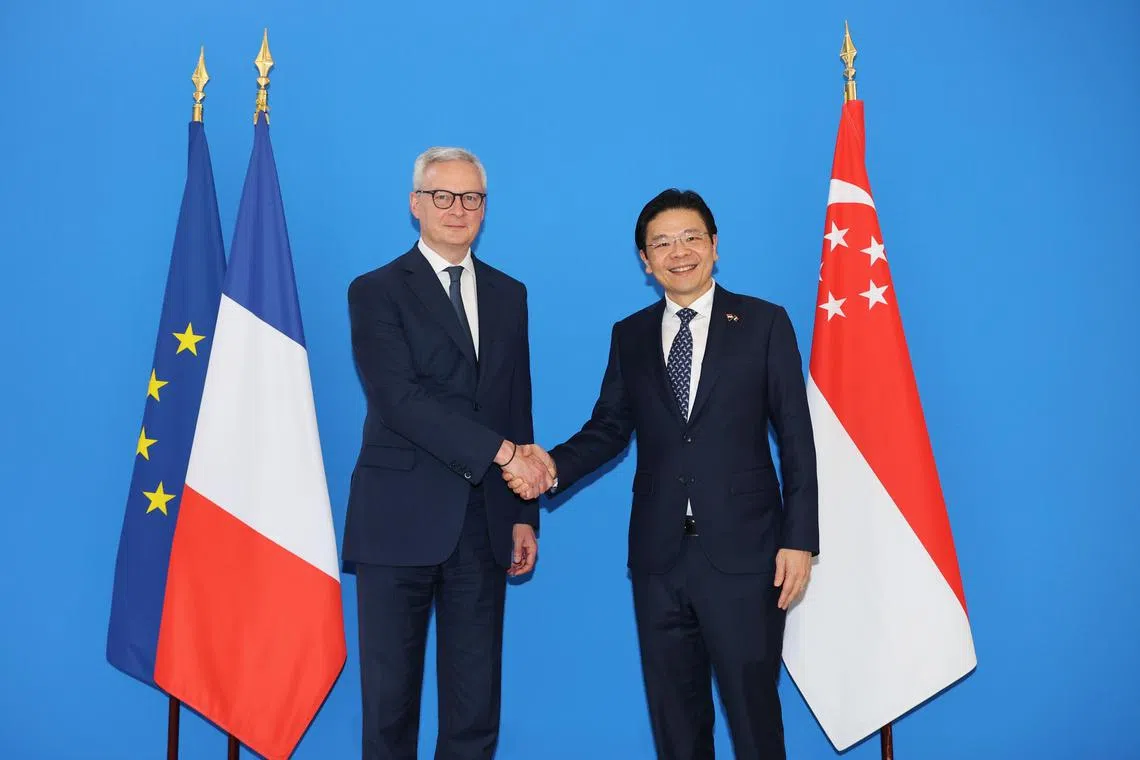Renewing and affirming partnerships important in troubled world: DPM Lawrence Wong
Sign up now: Get ST's newsletters delivered to your inbox

DPM Lawrence Wong meeting French Minister of the Economy, Finance, Industrial and Digital Sovereignty Bruno Le Maire in Paris on April 12, 2024.
PHOTO: LIANHE ZAOBAO
PARIS – In a new era of great power politics, it is important to renew and affirm close partnerships, even as Singapore moves forward in the troubled world, said Deputy Prime Minister Lawrence Wong.
This is why Singapore will update its strategic partnership with France, working towards stronger ties with a Comprehensive Strategic Partnership
Singapore and Germany will also work towards upgrading their relations to a strategic partnership
DPM Wong, who is also Finance Minister, was in Germany from April 8 to April 10, and France from April 10 to April 13, during which he called on senior government and industry leaders of both countries.
When asked if these trips have helped him build rapport with overseas counterparts as he prepares to take over as prime minister, he said: “That is the purpose of these trips – it is really for me to be able to engage in these countries and, importantly, to engage the leaders whom I will be working with not just now in my current capacity, but also in the future when I take over (as prime minister).”
He was speaking to the Singapore media in an interview at the Singapore Embassy office in Paris at the end of his first visit to Europe in his current capacity. China in May 2023 United States in October 2023.
DPM Wong will take over the reins
The upgrading of relations is not just about a name change, said DPM Wong.
“It is not just about adding ‘strategic’ or ‘comprehensive’ to the relationship – it is really about affirming and adding substance in what we do together,” he said.
This includes identifying new areas of cooperation in shared interests such as possibly artificial intelligence, digital innovation, green and sustainability projects, or even defence and security cooperation, in which Singapore already has close relations with both countries.
Europe is spending more on defence, especially with the Russian invasion of Ukraine,
The updating or upgrading of partnership is also a reflection of current realities, he said. Singapore has had a strategic partnership with France for more than 10 years, and both have worked together in areas like defence, security and economics. The partnership now covers a wide range of different areas that are truly “comprehensive” in nature, he said.
Even though Singapore does not have any strategic partnership with Germany yet, the relationship has grown in substance over the years in economics and defence. Hence, it is appropriate to call it a “strategic partnership”, he added.
Another motivation behind the elevation of ties is to mark a new phase in the relationship, and to do more together in the next phase, said DPM Wong.
Singapore and France have agreed to designate 2024-2025 as the France-Singapore Joint Year of Sustainability (JYOS) to commemorate the 60th anniversary of the establishment of their diplomatic relations in 2025.
The JYOS demonstrates both countries’ commitment to achieve net-zero carbon emissions by 2050.
There will be a series of sustainability-focused events and initiatives from April 2024 to mid-2025. French and Singapore government agencies will work together as well as with external stakeholders to promote bilateral initiatives and investments in green and sustainable development.
The JYOS will build on existing mechanisms like the Joint Committee on Science and Innovation, France-Singapore Digital and Green Partnership, memorandum of understanding on cooperation in the maritime field
There are five priority sectors: circular economy; renewable energy, energy efficiency and sustainable built environment; sustainability in the Digital and Green Partnership; blended finance/financing the transition; and sustainability in the maritime domain.
There can also be green projects in South-east Asia to accelerate the region’s green transition, and to have more renewable energy projects, DPM Wong said.
While Singapore has not decided to adopt nuclear power, it could learn more to enhance its own capabilities and knowledge, he added. France, for example, has experience and expertise running nuclear power plants, and is doing research and development in new nuclear technologies.
“So, it is useful for us to learn more about nuclear power, more about the state of play with regard to nuclear technologies, and also enhance our capabilities with regard to nuclear safety,” he said, adding that some countries in the region may decide to have a nuclear power plant at some point in time.


